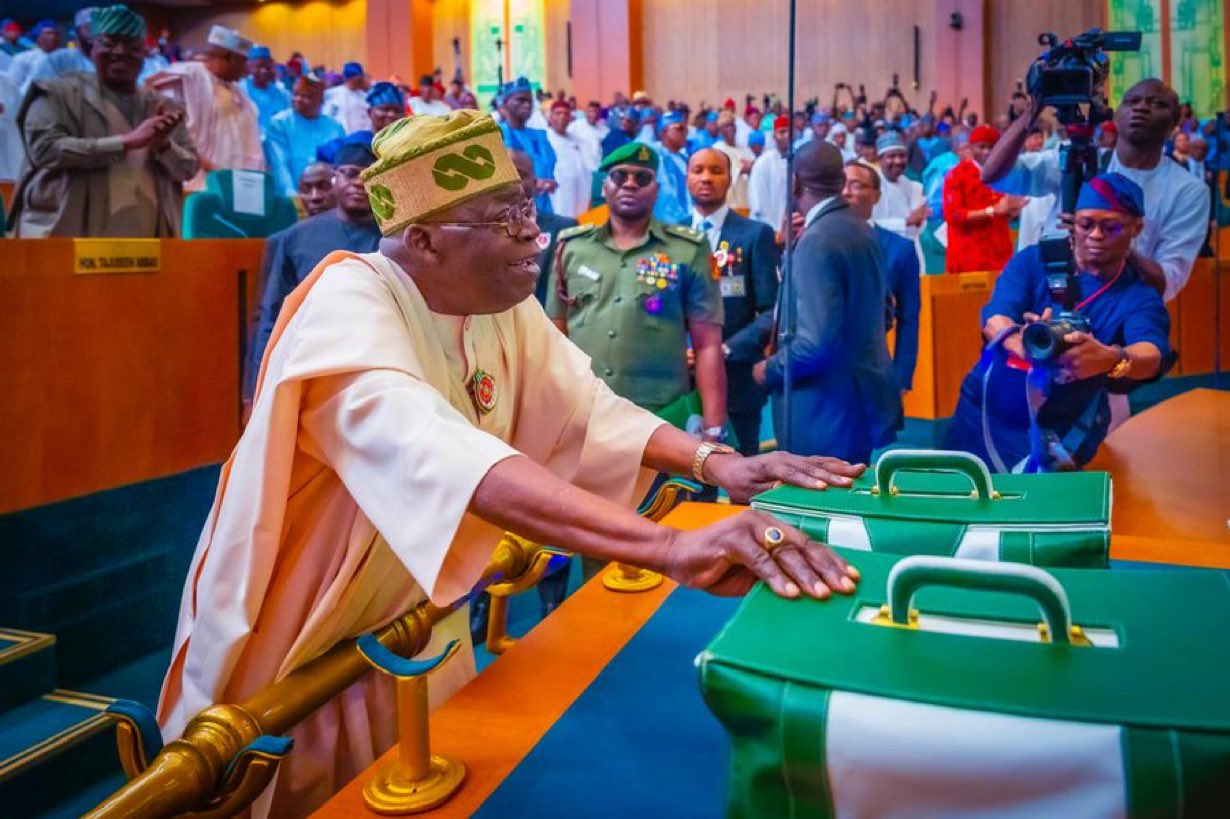By Muchee News
Abuja, Nigeria – In a defining moment for Nigeria’s economic future, President Bola Ahmed Tinubu today presented the highly anticipated 2025 Appropriation Bill, aptly titled the “Budget of Restoration,” to a joint session of the National Assembly. The N26.32 trillion budget reflects the administration’s unwavering commitment to economic reform, social development, and sustainable growth.
This budget is more than a fiscal document; it is a carefully crafted blueprint for national transformation. By addressing critical sectors such as education, health, infrastructure, and security, it seeks to catalyze economic recovery and chart a course toward lasting prosperity.
Thematic Pillars of the Budget of Restoration
- Human Capital Development: A Foundation for Sustainable Growth
A hallmark of the budget is its significant focus on human capital development, underscoring the administration’s recognition that a well-educated and healthy population is crucial for national progress.
Education: The allocation of ₦3.52 trillion to education is one of the largest in recent years. This funding will prioritize:
Upgrading school infrastructure.
Recruiting and training qualified teachers.
Expanding access to quality education, especially in underserved regions.
Health: With ₦2.48 trillion earmarked for healthcare, the budget aims to enhance healthcare delivery through:
Revitalizing primary healthcare centers.
Improving access to essential medicines and services.
Strengthening responses to public health emergencies.
- Economic Diversification: Unlocking Nigeria’s Potential
The budget’s focus on diversifying the economy reflects the administration’s resolve to reduce dependence on oil and create a resilient economic structure.
Industrial Development: A dedicated ₦2.85 trillion will bolster local industries, support SMEs, and promote agricultural value chains.
Tech and Innovation: Investments in digital infrastructure and innovation hubs aim to position Nigeria as a global player in the technology sector.
Energy Transition: The budget includes significant allocations for renewable energy projects, signaling a commitment to sustainable development.
- Infrastructure Expansion: Bridging Development Gaps
Recognizing the pivotal role of infrastructure in economic growth, the government has allocated ₦5.42 trillion to critical projects.
Transport: Massive investments in rail, road, and port infrastructure are expected to ease logistical bottlenecks and stimulate trade.
Energy: Funding for power generation and grid expansion will address Nigeria’s chronic energy deficits, boosting industrial and domestic productivity.
- Tackling Poverty and Social Inequality
The budget sets aside ₦1.25 trillion for social investment programs targeting poverty alleviation and social inclusion. Initiatives include:
Conditional cash transfers to vulnerable populations.
Youth empowerment schemes to address unemployment.
Support for women-owned businesses and marginalized groups.
- Security and Stability: A Prerequisite for Development
With ₦2.91 trillion allocated to security, the government aims to strengthen Nigeria’s defense capabilities and ensure stability. Key measures include:
Equipping the military with advanced technology.
Enhancing community policing efforts to combat local crime.
Intensifying counter-terrorism operations to secure the nation.
Fiscal Prudence and Revenue Generation
The administration’s approach to fiscal discipline is evident in measures to streamline government spending and maximize revenue collection.
Tax Reforms: Expanding the tax base and improving compliance are central to increasing non-oil revenues.
Public-Private Partnerships (PPPs): The budget outlines strategies to attract private investments in infrastructure and social projects.
Debt Management: While acknowledging Nigeria’s rising debt profile, the government emphasizes its commitment to ensuring debt sustainability through efficient utilization of borrowed funds.
In-Depth Analysis: Challenges and Opportunities
Restoring Confidence in Governance
The Budget of Restoration represents a bold step toward rebuilding public trust in the government’s ability to deliver. However, successful implementation will depend on addressing systemic inefficiencies, curbing corruption, and ensuring transparency in public expenditure.
Balancing Economic Realities
With global economic headwinds, fluctuating oil prices, and domestic inflation, Nigeria faces significant fiscal pressures. The government’s ability to meet revenue projections and manage deficit financing will be critical to the budget’s success.
Maximizing Impact
While the allocations are ambitious, the impact will ultimately depend on execution. Timely release of funds, effective monitoring, and stakeholder collaboration are essential to translating these investments into tangible benefits for citizens.
Conclusion: A Visionary Path Forward
President Tinubu’s 2025 Budget of Restoration is a bold and strategic plan to address Nigeria’s pressing challenges while laying the groundwork for sustainable development. Its emphasis on human capital, infrastructure, and economic diversification reflects a comprehensive approach to nation-building.
As Nigerians look forward to 2025, the successful implementation of this budget could redefine the country’s trajectory, ensuring a more prosperous and equitable future for all.
Muchee News will continue to provide comprehensive coverage and insights into the 2025 budget and its implications for Nigeria’s development.
Contact:
Muchee News Desk





